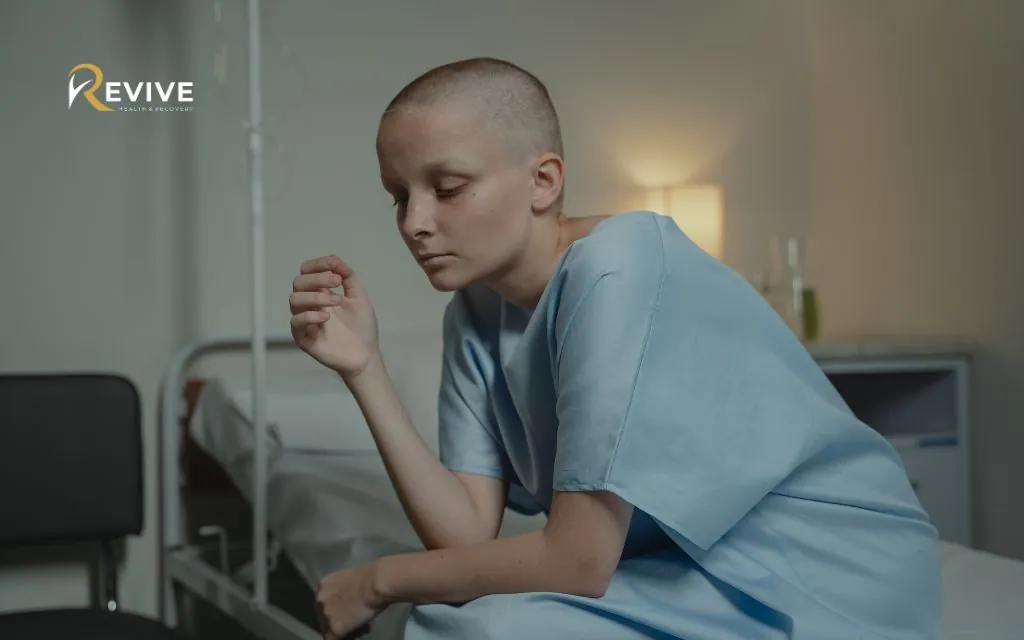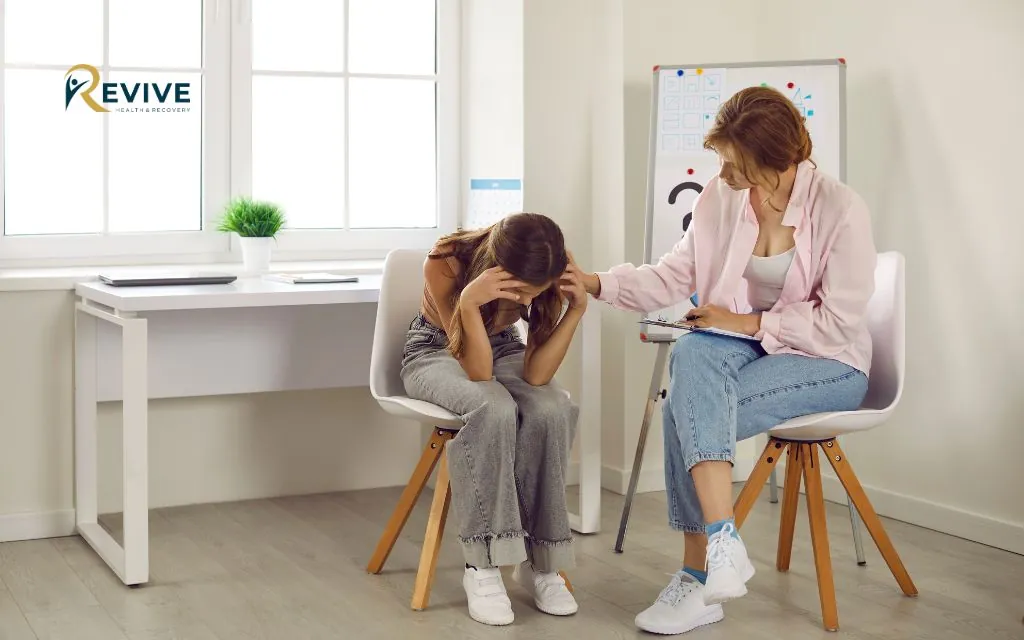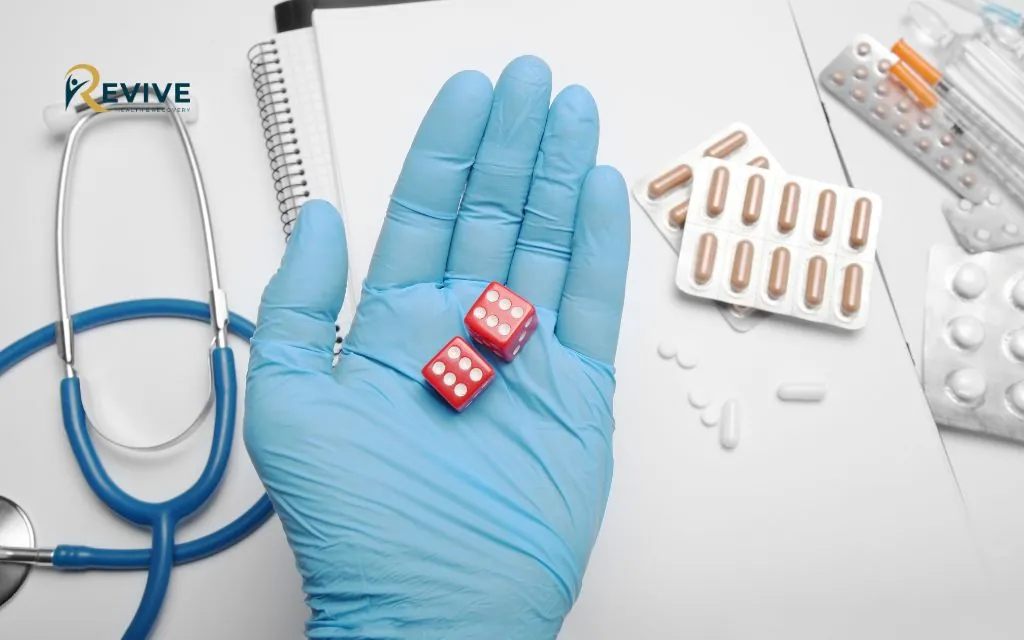Depression affects one in eight Denver residents, creating a significant challenge for our community. Finding appropriate treatment can feel overwhelming, especially when you’re already struggling with the weight of depression. But hope exists – effective treatment facilities for depression are available throughout Denver, and recovery is possible.
At Revive Health Recovery, we understand the complexities of depression and commit to providing compassionate, evidence-based care tailored to your unique needs. Our approach combines clinical expertise with genuine understanding, creating a foundation for lasting wellness.
This guide explores depression treatment options in Denver, helping you navigate available resources and find the right path forward for your healing journey.
Understanding Depression Treatment Options in Denver
Types of Depression Treatment Facilities Available in Colorado
Denver offers several treatment models for depression, each designed to meet different levels of need:
Inpatient treatment centers provide 24-hour care in a hospital-like setting. These facilities, like Denver Springs, offer intensive support for severe depression, particularly when safety concerns exist or when individuals need close monitoring during medication changes.
Outpatient therapy programs allow you to receive treatment while maintaining your daily routine. These typically involve weekly sessions with a therapist to address depression symptoms and develop coping strategies.
Intensive Outpatient Programs (IOPs) bridge the gap between standard outpatient therapy and inpatient care. At Revive Health Recovery, our IOP provides structured treatment multiple days per week while allowing you to continue living at home and maintaining work responsibilities.
Partial Hospitalization Programs (PHPs) offer comprehensive daily treatment without overnight stays. These programs provide intensive therapy and medication management during daytime hours.
Telehealth mental health services have expanded significantly, offering virtual appointments with therapists and psychiatrists – particularly valuable for those with transportation challenges or busy schedules.
The Depression Crisis in Colorado: Facts and Statistics
Colorado’s mental health landscape presents unique challenges. Despite our state’s reputation for healthy living, Colorado ranks 45th nationwide for mental health services, highlighting significant gaps in care.
Denver’s depression rates exceed national averages, with altitude potentially playing a role. Research suggests Denver’s elevation can impact neurochemistry and medication effectiveness, requiring specialized approaches to treatment.
The Colorado Behavioral Health Administration has implemented initiatives to improve access to care, working alongside providers like Revive Health Recovery to expand treatment options and reduce barriers to services.

Essential Components of Effective Depression Treatment Programs
Evidence-Based Therapeutic Approaches
Research-validated therapies form the cornerstone of effective depression treatment:
Cognitive Behavioral Therapy (CBT) helps identify and change negative thought patterns that contribute to depression. This approach teaches practical skills to challenge distorted thinking and develop healthier mental habits.
Dialectical Behavior Therapy (DBT) combines cognitive techniques with mindfulness practices, helping regulate emotions and improve relationships – particularly beneficial for those experiencing intense emotional struggles alongside depression.
Interpersonal Therapy focuses on improving communication patterns and addressing relationship issues that may contribute to or worsen depression.
At Revive Health Recovery, we incorporate group therapy to reduce isolation and build community support. Our clients consistently report that connecting with others who understand their experience provides unique healing benefits.
Family involvement plays a crucial role in treatment success. We offer family education and therapy sessions, recognizing that depression affects not just individuals but entire family systems.
Medication Management and Psychiatric Services
For many people, medication forms an important part of depression treatment:
Antidepressant medications help correct chemical imbalances that contribute to depression symptoms. Options include SSRIs, SNRIs, and other medication classes, each with different benefits and side effect profiles.
Effective treatment requires careful medication monitoring and adjustment. Our psychiatrists at Revive Health Recovery work closely with clients to find the right medication and dosage, making adjustments as needed to maximize benefits while minimizing side effects.
Some facilities offer genetic testing for medication response, helping identify which medications may work best based on your genetic profile – potentially reducing the trial-and-error process often associated with finding effective medication.
The most successful treatment plans feature coordination between therapy and medication. Our integrated approach ensures your therapist and psychiatrist work together, creating a cohesive treatment plan.
Innovative Depression Treatments Available in Denver
Denver leads in offering advanced treatment options for depression:
- Transcranial Magnetic Stimulation (TMS) uses magnetic pulses to stimulate nerve cells in brain regions associated with mood regulation. This non-invasive procedure has shown promise for treatment-resistant depression.
- Ketamine therapy offers rapid relief for some individuals who haven’t responded to traditional treatments. Several specialized clinics in Denver provide this service under medical supervision.
- Holistic approaches complement traditional treatments. At Revive Health Recovery, we integrate mindfulness practices, art therapy, and movement-based interventions to address the whole person, not just symptoms.
Our integrative treatment model combines evidence-based clinical approaches with wellness practices, creating comprehensive care that addresses depression from multiple angles.
Navigating Insurance and Cost Considerations for Depression Treatment
Colorado Insurance Coverage for Mental Health Services
Colorado’s mental health parity law requires insurance companies to cover mental health services at the same level as physical health services, though specific coverage details vary by plan.
Health First Colorado (Medicaid) covers many mental health services for eligible individuals, including therapy, medication management, and sometimes more intensive treatment programs.
Private insurance plans typically cover depression treatment, though with varying limitations on session numbers, provider networks, and treatment types. Verifying your specific coverage before beginning treatment is essential.
Understanding out-of-pocket cost expectations helps with financial planning. These may include copays, coinsurance, deductibles, and any services not covered by your insurance plan.

Finding Affordable Depression Treatment in Denver
Various options exist for those concerned about treatment costs:
Sliding scale options adjust fees based on income, making care more accessible. Revive Health Recovery offers flexible payment options to ensure financial constraints don’t prevent access to quality care.
Community mental health centers provide services at reduced rates, often accepting Medicaid and offering sliding scale payments.
Some providers offer pro bono services for individuals with significant financial hardship.
Support groups and peer resources provide valuable complementary support at little to no cost. While not a replacement for professional treatment, these groups offer important connection and validation.
Have questions about insurance coverage or payment options? Call us at (303) 268-4655, and our team will help you understand your options.
Choosing the Right Depression Treatment Facility in Denver
Key Factors to Consider in Your Selection
Finding the right fit involves several considerations:
Treatment approach and philosophy should align with your preferences and needs. Some facilities focus primarily on medication management, while others, like Revive Health Recovery, offer integrated approaches combining medication with various therapy modalities.
Verify provider qualifications and specializations. Look for licensed professionals with specific training in depression treatment and experience with your particular concerns.
Consider location and accessibility when choosing a facility. Our convenient South Federal location offers easy access via public transportation, making regular attendance more manageable.
Schedule flexibility and program duration matter significantly, especially for working professionals. Revive Health Recovery offers evening programs specifically designed for those balancing treatment with work responsibilities.
Review success rates and patient testimonials to gauge effectiveness. While depression treatment outcomes vary individually, facilities should be transparent about their approach and results.
Questions to Ask When Evaluating Depression Treatment Centers
When researching facilities, consider asking:
About treatment protocols: “What specific therapies do you use for depression, and how do you determine which approaches will work best for me?”
About provider credentials: “What are the qualifications of your therapists and psychiatrists? Do they have specialized training in depression treatment?”
About insurance and payment options: “Do you accept my insurance plan? What will my out-of-pocket costs be?”
About aftercare and ongoing support: “What happens after the initial treatment phase? How will you support my long-term recovery?”

The Revive Health Recovery Approach to Depression Treatment
Comprehensive Assessment and Personalized Treatment Planning
Our treatment process begins with a thorough evaluation to understand your specific needs:
Our initial evaluation process examines your depression symptoms, history, life circumstances, and goals, creating a complete picture of your unique situation.
Based on this assessment, we develop individualized care planning that addresses your specific challenges and leverages your personal strengths.
Regular progress monitoring and adjustment ensures your treatment evolves as you do. We continually refine your care plan based on what’s working and what needs modification.
We celebrate recovery milestone achievements, recognizing progress along the way – not just at the completion of treatment.
Flexible Treatment Options for Busy Denver Residents
We understand the challenges of balancing treatment with daily responsibilities:
Our evening program availability makes quality care accessible for working professionals, eliminating the need to choose between career obligations and mental health.
Our integrative treatment approaches combine evidence-based therapies with complementary practices, creating comprehensive care that addresses depression from multiple angles.
Our dual diagnosis capabilities allow us to effectively treat depression occurring alongside substance use disorders or other mental health conditions.
Our South Federal location provides convenient access via public transportation, removing potential barriers to consistent attendance.
Holistic Support for Sustainable Recovery
True recovery extends beyond symptom reduction:
We incorporate mindfulness and meditation practices to build present-moment awareness and emotional regulation skills that support long-term wellness.
Our approach includes lifestyle modifications for depression management, addressing sleep, nutrition, exercise, and social connection as fundamental components of mental health.
We emphasize community integration and support, helping build connections that sustain recovery beyond formal treatment.
Our long-term wellness planning prepares you for ongoing self-care, helping maintain improvements and prevent relapse.
FAQs About Treatment Facilities for Depression
How do I know if I need professional help for depression?
If depression symptoms persist for more than two weeks, interfere with daily functioning, or include thoughts of self-harm, professional help is warranted. Revive Health Recovery offers confidential assessments to determine appropriate levels of care tailored to your needs.
What’s the difference between outpatient and inpatient depression treatment?
Outpatient treatment allows you to live at home while attending regular therapy sessions, while inpatient treatment provides 24-hour care in a hospital setting. Revive Health Recovery specializes in outpatient and intensive outpatient programs that provide comprehensive care while maintaining your daily routine.
How long does typical depression treatment take to be effective?
While some improvement may occur within weeks, meaningful recovery often takes several months of consistent treatment. Revive Health Recovery designs individualized treatment plans that adapt to your progress, providing the right level of support throughout your recovery journey.
Will my insurance cover depression treatment in Denver?
Colorado law requires insurance companies to cover mental health services. Revive Health Recovery works with most major insurance providers and offers verification services to determine your specific coverage. Contact us at (303) 268-4655 for assistance understanding your benefits.
What treatment options are available if medication hasn’t helped my depression?
Revive Health Recovery offers alternative approaches including specialized therapy modalities, holistic treatments, and connections to innovative services like TMS or ketamine therapy when appropriate. Our integrated care team can help determine which alternatives might work best for your situation.
5 Reasons to Choose Revive Health Recovery for Depression Treatment
- Specialized expertise in depression and dual diagnosis treatment allows us to address complex cases with nuanced, effective approaches.
- Flexible scheduling options including evening programs make quality care accessible for working professionals and busy parents.
- Comprehensive approach combining traditional and holistic therapies creates treatment plans that address the whole person, not just symptoms.
- Convenient South Federal location with transportation options removes barriers to consistent attendance and engagement.
- Individualized treatment planning and personal attention ensures your unique needs and goals drive your recovery process.
Taking the First Step Toward Healing
Finding effective depression treatment represents an act of courage and self-compassion. The journey may seem daunting, but you don’t have to walk it alone. At Our Denver Mood Improvement Therapy, we provide the expertise, support, and personalized care needed to navigate depression and reclaim your sense of wellbeing.
When you’re ready to explore treatment options, our compassionate team is here to answer your questions and guide you through the process. Recovery begins with a single step – reach out today.
Contact Revive Health Recovery at (303) 268-4655 or visit our center at 1427 S Federal Blvd, Denver, CO 80219 to start your journey toward healing.



